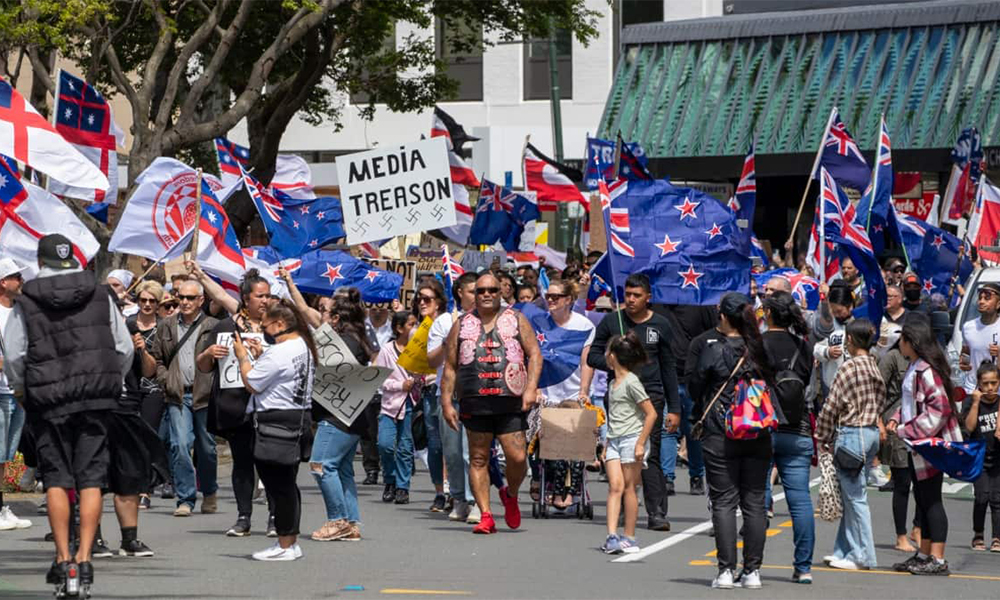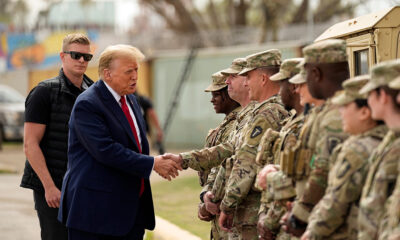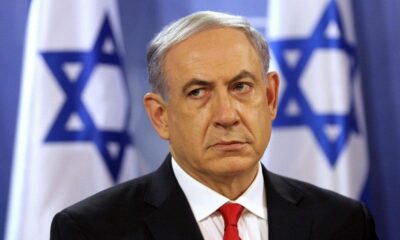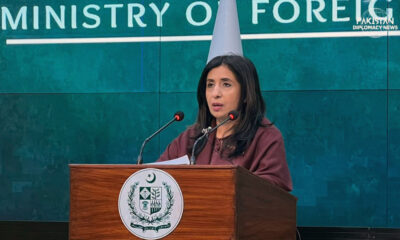COVID-19
New Zealand police make arrests as COVID vaccine mandate protests enter 3rd day

New Zealand police on Thursday arrested more than 50 people and began forcefully removing hundreds of protesters camped outside its parliament building for the last three days to protest COVID-19 vaccine mandates and tough coronavirus restrictions, Reuters reported.
Inspired by truckers' demonstrations in Canada, into a 13th day with protesters blocking two border crossings with the United States, several thousand protesters this week blocked streets near the parliament in capital Wellington with trucks, cars and motorcycles.
A country of five million people, New Zealand has reported just over 18,000 confirmed cases and 53 deaths since the pandemic began. About 94% of eligible people are vaccinated, with shots mandatory for some staff in frontline jobs.
Prime Minister Jacinda Ardern on Thursday told the protesters to "move on", saying the protests are not a reflection of what the majority in the country feels. As of 14.45 local time (0145 GMT), about a thousand protesters remained at the site, defying warnings and efforts by the police to clear them, Reuters reported.
"All of us want to actually move on. We are working very hard to put ourselves in the best possible position to do that," Ardern told reporters after visiting a COVID-19 vaccination centre in Auckland.
Ardern acknowledged every New Zealander had the right to protest, but said that should not disrupt others' lives. Removing protesters was an operational matter for police, she said.
According to the report despite garnering plaudits for keeping the country virtually virus-free over the last two years, the strict restrictions now in place have become unpopular, with Ardern's approval ratings taking a hit in recent opinion polls.
With borders still closed, tens of thousands of expatriate New Zealanders face being cut off from families, while tourism businesses are struggling to stay afloat.
'WANT OUR FREEDOM BACK'
Speaker Trevor Mallard on Thursday authorised the closure of grounds around the distinctive 'Beehive' parliament building, after which demonstrators quickly confronted police officers, banging drums and screaming insults. Some were seen throwing empty plastic bottles at the police, read the report.
As the crowd pushed against barriers, police pulled them out and wrestled them to the ground, a Reuters witness said. Dozens were handcuffed and taken away amid cries of "Shame on you!" from the crowd.
Many protesters, who said they were vaccinated but were against mandating vaccines, were seen holding placards saying "Freedom", "Leave our kids alone" and "Let me work".
"We are not going anywhere. We will hold the line and see this through," said one demonstrator who gave his name only as Adam, and said he had come from Palmerston North, about 140 km (87 miles) north of Wellington.
"We want our freedom back," said another protester, identifying himself as Dave. "Jacinda (Ardern) has turned her back on us. Kiwis are not dumb. We are losing our jobs and our lives due to these mandates and restrictions."
Police said those arrested will face trespass and obstruction charges, and will be bailed to appear in court. Authorities have also appealed to the owners or drivers of vehicles blocking streets surrounding parliament grounds to remove them or face enforcement action, Reuters reported.
COVID-19
WHO declares end to COVID global health emergency

The World Health Organization said Friday that COVID-19 no longer qualifies as a global emergency, marking a symbolic end to the devastating coronavirus pandemic that triggered once-unthinkable lockdowns, upended economies and killed millions of people worldwide.
The announcement, made more than three years after WHO declared the coronavirus an international crisis, offers some relief, if not an ending, to a pandemic that stirred fear and suspicion, hand-wringing and finger-pointing across the globe, AP reported.
The U.N. health agency’s officials said that even though the emergency phase was over, the pandemic hasn’t finished, noting recent spikes in cases in Southeast Asia and the Middle East.
WHO says thousands of people are still dying from the virus every week, and millions of others are suffering from debilitating, long-term effects.
“It’s with great hope that I declare COVID-19 over as a global health emergency,” WHO Director-General Tedros Adhanom Ghebreyesus said.
“That does not mean COVID-19 is over as a global health threat,” he said, warning that new variants could yet emerge. Tedros noted that while the official COVID-19 death toll was 7 million, the real figure was estimated to be at least 20 million.
Tedros said the pandemic had been on a downward trend for more than a year, acknowledging that most countries have already returned to life before COVID-19.
He bemoaned the damage that COVID-19 had done to the global community, saying the pandemic had shattered businesses, exacerbated political divisions, led to the spread of misinformation and plunged millions into poverty.
When the U.N. health agency first declared the coronavirus to be an international crisis on Jan. 30, 2020, it hadn’t yet been named COVID-19 and there were no major outbreaks beyond China.
More than three years later, the virus has caused an estimated 764 million cases globally and about 5 billion people have received at least one dose of vaccine.
In the U.S., the public health emergency declaration made regarding COVID-19 is set to expire on May 11, when wide-ranging measures to support the pandemic response, including vaccine mandates, will end. Many other countries, including Germany, France and Britain, dropped most of their provisions against the pandemic last year.
When Tedros declared COVID-19 to be an emergency in 2020, he said his greatest fear was the virus’ potential to spread in countries with weak health systems.
Most recently, WHO has struggled to investigate the origins of the coronavirus, a challenging scientific endeavor that has also become politically fraught.
COVID-19
COVID-19 in Iran: Nearly 900 new cases, 24 deaths recorded

The Iranian health ministry announced on Sunday that more than 890 new cases of COVID-19 have been identified across the country during the past 24 hours, adding that 24 patients have died in the same period of time, Fars News Agency reported.
"A sum of 891 new patients infected with COVID-19 have been identified in the country based on confirmed diagnosis criteria during the past 24 hours," the Iranian Health Ministry's Public Relations Center said on Sunday, adding, "454 patients have been hospitalized during the same time span."
The ministry’s public relations center said 611 people infected with COVID-19 are in critical condition.
COVID-19
China says 200 million treated, pandemic ‘decisively’ beaten

China says more than 200 million of its citizens have been diagnosed and treated for COVID-19 since it lifted strict containment measures beginning in November.
With 800,000 of the most critically ill patients having recovered, China has “decisively beaten” the pandemic, according to notes from a meeting of the ruling Communist Party’s all-powerful Politburo Standing Committee presided over by President and party leader Xi Jinping, AP reported.
China enforced some of the world’s most draconian lockdowns, quarantines and travel restrictions and still faces questions about the origins of the virus that was first detected in the central Chinese city of Wuhan in late 2019. Heavy-handed enforcement prompted rare anti-government protests and took a heavy toll on the world’s second-largest economy.
The official Xinhua News Agency quoted Xi as saying that policies to control the outbreak had been “entirely correct.” The abrupt lifting in November and December of the “zero COVID” policy that had sought to eliminate all cases of the virus led to a surge in infections that temporarily overwhelmed hospitals.
Case numbers have since peaked and life has largely returned to normal, although international travel in and out of China has yet to return to pre-pandemic levels.
China is now transitioning to a post-pandemic stage after a fight against the outbreak that was “extraordinary in the extreme,” Xinhua said.
The government will continue to “optimize and adjust prevention and control policies and measures according to the times and situations with a strong historical responsibility and strong strategic determination,” Xinhua said.
-

 Latest News5 days ago
Latest News5 days agoOttawa taking detention of Canadian in Afghanistan ‘very seriously’
-

 Sport5 days ago
Sport5 days agoFIFA unveils Innovative Club World Cup Trophy ahead of new tournament in 2025
-

 Regional5 days ago
Regional5 days agoIndia’s successful test of hypersonic missile puts it among elite group
-

 Latest News5 days ago
Latest News5 days agoTrump team compiling list of military officers responsible for US withdrawal from Afghanistan
-

 Latest News5 days ago
Latest News5 days agoCanada sent 19 failed asylum seekers back to Afghanistan last year
-

 Sport4 days ago
Sport4 days agoAbu Dhabi’s thrilling T10 tournament just days away
-

 World4 days ago
World4 days agoBiden allows Ukraine to use US arms to strike inside Russia
-

 Sport4 days ago
Sport4 days agoAfghanistan beat UAE by 169 runs in U19 tri-series
























